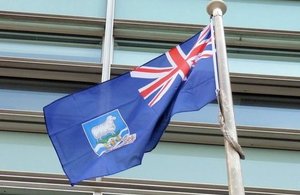Falklands flag flies in Westminster to honour islands' liberation from Argentine occupation
Falkland Islands flag raised to mark Liberation Day.

Falklands flag
Communities Secretary Eric Pickles raised the flag of the Falkland Islands today outside his department’s headquarters in the heart of government to mark the islands’ Liberation Day.
On 14 June 1982 the Falklands were freed after an unprovoked Argentine invasion – as Argentinian commander General Mario Menendez surrendered to British forces at Stanley – marking the end of the war in the South Atlantic.
Events to mark the islands’ liberation from a 74-day occupation now take place every year on that date.
Eric Pickles, Secretary of State for Communities and Local Government, said:
Today, we pay tribute to the bravery of our Armed Forces who liberated the Falklands from totalitarian aggression 32 years ago on this day.
British forces risked their lives to defend British sovereign territory and the rights of British people to determine their own future. This was a victory both for freedom and the indefatigable spirit of those living on these Islands.
Further information
Today’s flag flying is part of a wider initiative to recognise and celebrate local, national and international flags, including Crown Dependencies and Overseas Territories.
Britain has 14 Overseas Territories which encompass over 600,000 square miles and are home to 260,000 people - more than Nottingham or Newcastle. The Falkland Islands are made up of over 700 islands with the two largest, West and East Falkland home to around 3,000 people.
Working with the independent Flag Institute, the government is encouraging more local communities to create their own local flags. The Institute has published a guide on creating new local and community flags.
The government has also relaxed the planning rules relating to the flying of flags to make it easier for a wider range of flags to be flown without the need for express consent which could cost up to £335. The changes are helping increase the number of flags people can fly, promoting integration and community spirit.
The United Kingdom Union flag always flies in superior position on the department’s primary flag pole. The secondary flag pole flies a range of national and international flags; the default flag is the Cross of St George, reflecting the department’s work with local government in England.
Media enquiries
Email newsdesk@communities.gov.uk
Please use this number if you are a journalist wishing to speak to Press Office 0303 444 1209
Office address and general enquiries
2 Marsham StreetLondon
SW1P 4DF
Contact form https://www.gov.uk/gui...
General enquiries: please use this number if you are a member of the public 030 3444 0000
If your enquiry is related to COVID-19 please check our guidance page first before you contact us - https://www.gov.uk/guidance/coronavirus-covid-19-guidance-for-local-government.
If you still need to contact us please use the contact form above to get in touch, because of coronavirus (COVID-19). If you send it by post it will not receive a reply within normal timescale.